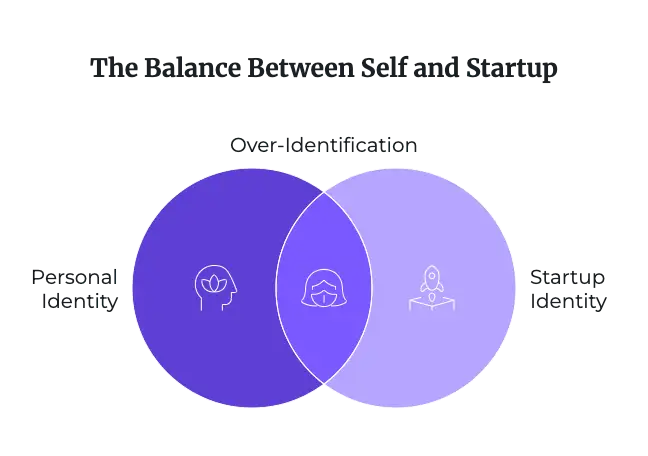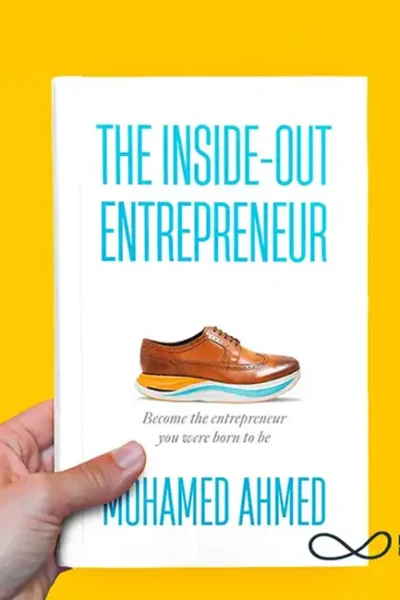In the world of entrepreneurship, many founders fall into a dangerous trap: tying their personal identity so closely to their startup that the line between self and business becomes blurred. While passion and dedication are essential for success, over-identification with your business can lead to mental health issues, poor decision-making, and even personal relationship deterioration.
In my book, The Inside-Out Entrepreneur, I delve deep into this crucial topic. Chapter 5 specifically addresses strategies to help entrepreneurs develop mental robustness and resiliency—skills that are vital when facing the inevitable ups and downs of startup life. Today, I want to share why separating your identity from your startup is critical for your personal well-being and business success.

The Hidden Dangers of Entrepreneur-Startup Fusion
When your sense of self becomes inextricably linked to your company’s performance, you create a precarious foundation for your mental health and decision-making abilities. As highlighted in Fast Company’s article on “The entrepreneur’s identity crisis,” this fusion creates a dangerous emotional rollercoaster—soaring highs when business is booming and crushing lows when facing setbacks.
This phenomenon isn’t just anecdotal. Research suggests that entrepreneurs are 72% more likely to suffer from mental health issues than the general population. Even more concerning, entrepreneurs and their spouses are 40% more likely to take antidepressants in the first year of their journey.
Here are the main risks of tying your identity too closely to your startup:
1. Emotional Volatility
When business metrics become personal metrics, every sales dip, critical customer feedback, or failed pitch feels like a personal failure rather than a normal business challenge. This volatility is exhausting and unsustainable.
2. Compromised Decision-Making
When your self-worth is on the line, making rational business decisions becomes nearly impossible. You might:
- Avoid necessary risks
- Struggle to pivot when needed
- Ignore red flags that contradict your vision
- Make decisions from a place of fear rather than strategy
3. Relationship Strain
Entrepreneurs often unintentionally bring their startup stress back home. As I share in Chapter 5 of my book:
“Your startup will add stress to your relationship with your family. You will have times when you are out of balance. You will subconsciously and unintentionally bring your startup stress back home.”
When your entire identity revolves around your business, you have little emotional capacity for meaningful connections with family and friends.
4. Burnout Risk
The entrepreneurial journey is a marathon, not a sprint. Without clear boundaries between yourself and your business, you risk burning out before reaching significant milestones.
Strategies for Maintaining a Multi-Faceted Identity (From Chapter 5)
In “The Inside-Out Entrepreneur,” I outline several key strategies for maintaining a healthy separation between your personal identity and your startup:
Strategy #1: Don’t Confuse Your Startup With Who You Are
Your startup is just one expression of your creativity and passion—not your entire identity. As I write in the book:
“Your self-worth stems from within. Your results or your achievements do not define it. Most entrepreneurs tie their success to their startup’s business results. They feel happy one day when they meet their numbers. Another day, they feel depressed or like failures if they miss their numbers.”
In “Your Next Five Moves,” Patrick Bet-David emphasizes that self-awareness is the foundation for sustainable entrepreneurship. Understanding who you are outside your business helps you navigate tough times and make decisions that align with your values.
Strategy #2: Break the Thoughts-Emotions Loop
Entrepreneurs often fall into destructive thought patterns when faced with challenges. Learning to recognize and interrupt this cycle is crucial for maintaining perspective.
The process I recommend involves:
- Building consciousness about your thoughts and emotions
- Asking “why” at least five times to get to the root cause
- Addressing the real issue once you’ve gained clarity
This technique helps prevent your startup’s challenges from spiraling into identity crises.
Strategy #3: Find a Trusted Person to Be Vulnerable With
Having someone you can open up to about your struggles is invaluable. I recommend having three different types of support:
- A mentor who will help you work on your mindset
- An advisor who will help you navigate business challenges
- A friend who is ahead of you on their journey and can support you both intellectually and emotionally
As Foundr magazine notes in their article “How to Run a Business Without Losing Your Identity,” creating a strong support network is essential for maintaining perspective during tough times.
Strategy #4: Plan Work Around Your Breaks
Many entrepreneurs fall into the trap of “hustling” without rest, but this approach is unsustainable. Instead:
“Plan your vacation one year in advance, then work around your major business events. For example, if you plan to fundraise sometime in the summer, ensure it doesn’t overlap with your vacation.”
Regular breaks help you maintain perspective and prevent your startup from consuming your identity.
Practical Exercises for Defining Success Beyond Business Metrics
To help build a healthier relationship with your startup, try these exercises from “The Inside-Out Entrepreneur”:
Exercise 1: Conduct a Self-Identity Audit
Take 15 minutes to list all your roles and identities beyond “entrepreneur” or “founder.” For example:
- Parent/spouse/partner
- Friend
- Community member
- Mentor
- Hobbyist (musician, runner, artist, etc.)
- Learner
- Volunteer
Reflect on how much time and energy you currently devote to each identity. Are some being neglected?
Exercise 2: Define Your Non-Negotiables
Identify the aspects of your life that you refuse to sacrifice for your business:
- Daily/weekly family time
- Health routines (sleep, exercise, nutrition)
- Personal passions and hobbies
- Learning and growth opportunities
- Spiritual practices
Write these down and review them weekly to ensure you’re honoring these commitments.
Exercise 3: Create a Personal Success Scorecard
Develop metrics for success that go beyond business outcomes:
- Relationship quality (time spent with loved ones, meaningful conversations)
- Health markers (sleep quality, energy levels, physical activity)
- Learning (books read, skills acquired, insights gained)
- Personal growth (challenges overcome, comfort zones expanded)
- Impact on others (mentorship, support, community contribution)
Rate yourself weekly in each category and celebrate wins that aren’t tied to business outcomes.
As discussed in UplevelMe’s article “How To Measure Success As An Entrepreneur Beyond Money,” these reflective exercises help entrepreneurs develop alternative metrics for measuring success and fulfillment.
Final Thoughts
Separating your identity from your startup isn’t about reducing your passion or commitment. Instead, it’s about creating a sustainable foundation from which your business can thrive without consuming your entire being.
Remember that your entrepreneurial journey is just one chapter in your life story—albeit an important one. By maintaining a multifaceted identity, you’ll not only be happier and healthier but also make better business decisions from a place of clarity rather than desperation.
As I emphasize throughout “The Inside-Out Entrepreneur,” true entrepreneurial success isn’t just about building a thriving business and becoming the best version of yourself.











Responses